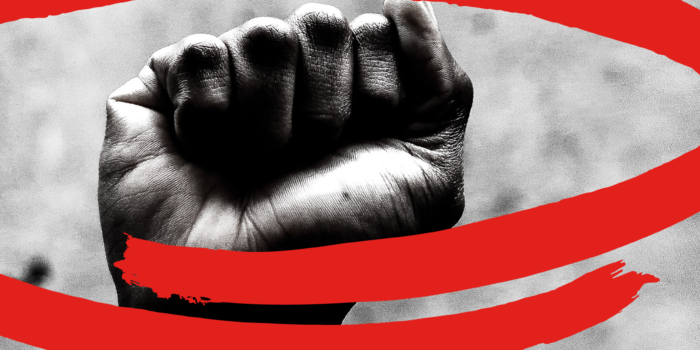How can an executive director realize their vision?
Vince Warren reflects on his twelve years (and counting!) as Executive Director of the Center for Constitutional Rights. Over the course of his tenure, Vince has built the organization around its potential—and his vision of what it could become. Tune in to learn about his, and the Center for Constitutional Rights’, journey.
Want more on the Center for Constitutional Rights? Read all about our branding work together in the case study, or listen to a conversation we shared with Chandra Hayslett, the Center for Constitutional Rights’ Communications Director.
Transcript
Sarah Durham: Welcome to the Smart Communications Podcast. I’m Sarah Durham, and I’m joined today by Vince Warren, the executive director of the Center for Constitutional Rights. Hi Vince.
Vince Warren: Hey Sarah.
Sarah Durham: So Vince, tell us a little bit about the Center for Constitutional Rights.
Vince Warren: Well, we’re a litigation and advocacy organization that’s been around for 50 years. And what we do is we partner with social movements in communities that are under threat, which is rare for lawyers to do, and together we work to dismantle oppression and we fight for justice.
Sarah Durham: So for those of you who listen to this podcast regularly, you’re probably starting to get familiar with the Center for Constitutional Rights. That’s because, full disclosure, Big Duck, my company works with the center, but more so, there are so many great learnings from this organization. I’ve invited Vince and other colleagues at the Center for Constitutional Rights to join me for other discussions. And along the way through getting to know Vince and getting to know the center, he and I have had a series of conversations, probably over years at this point, about how his vision as an executive director takes shape. So I invited him on the podcast today to talk about that, because it strikes me that with, is it 12 years?
Vince Warren: Mm-hmm (affirmative).
Sarah Durham: As a CEO?
Vince Warren: Yeah.
Sarah Durham: That that’s a long journey to see what you want to do come to life. So, tell us a little bit about that journey as you look back in time over those years. How did you formulate a vision, and how do you bring it to life?
Vince Warren: Well, I started off 12 years ago. I actually transitioned onto the organization from the board. And many years prior to that I was actually a summer intern at the organization. But when I started I was completely green. I had not run anything in my life other than cases, but there was something that I deeply loved about the organization. And I realized maybe a few years later that I loved the organization’s potential. It is bold, it is out there. It’s always been pushing the envelope. And I think that’s rare in nonprofits. And so as I came on board, I began to try to think about how we would lean into taking on cases before other organizations were ready to take them, how we would message so drastically that it would really garner attention. It would make people on the left feel like, yeah, that’s what we think, and it would grab the attention of people in the center and on the right. So I started to try to build the organization essentially around different parts of its potential. So I started off with development. We needed more money, we needed more staff. I increased the development staff in order to have a longer term vision of shifting the work, which had been largely human rights Guantanamo, and building racial justice and criminal justice, which we had done for many years.
Vince Warren: And then from that point to be able to build the communications staff, to be able to not just support that work, but also to start thinking about communications as a strand of our advocacy as well. So looking back on it, it’s interesting, as you’re building it forward, it’s nothing but worry, and sweat, in adjecta, but when you look back on it, you realize that there are some things that are so much easier to do now, that there are places that we can get to that we just couldn’t have gotten 10 years ago. And it’s not just a question of resources, of financial resources, it’s about how the staff thinks, it’s about how the staff feels about its work. So that’s been really, really rewarding.
Sarah Durham: So you’re describing, when you talk about developing your internal capacity for fundraising, or for communications, you’re talking about what I think of as backstage work. Capacity building, infrastructure building, not necessarily fun sexy stuff, but essential to give your team the capacity to do the front stage work, the important front stage work. Did you see the results of that quickly? How long did it take, that sort of internal capacity building before you started to begin to see the seeds of that potential getting realized?
Vince Warren: I saw sort of immediate improvements. I mean, I think anytime that you make a commitment to invest in administration or in development, you begin to see how things happen a little bit more easily. But you know the fruits don’t really come until much later. Where I really saw it was, as we moved to the next stage of building in more programmatic work, so we hired lawyers that were doing racial justice, and criminal justice, and gender justice, and then we hired advocacy staff to support them. The development structure was able to build on those things and so, as then the programmatic work started to bear fruit, I think in terms of its own goals, and to increase external interest in the organization, we then saw that we were in a good position to be able to support that.
Sarah Durham: There’s a cycle there, where the programmatic experts, the legal experts feed and collaborate with the development team, the communications team, who give them a lift by getting the issues out there in new and empowering ways.
Vince Warren: Exactly, and it’s going to sound super corny, Sarah. Super corny. So be prepared.
Sarah Durham: I’ll brace myself.
Vince Warren: When I started at CCR, it was an organization that was really fueled by anger, and rightfully so—people were just pissed off at the way the world works. And what I noticed was in organizations that are fueled like that, it doesn’t take much for that anger to be turned internally to the point where you really can’t do much of anything. So I really started talking very clearly about how love had as much to do with what we were doing as fighting. And that those things could coexist, and that sort the love and the empathy that we feel towards our clients, the people that we represent, right now, people that are applying for asylum and are getting turned away, or people that are in solitary confinement, that can be reflected in the way that we organize ourselves and think about our work internally. And that’s been really the very fun part. We have a lot more fun than we used to. We joke around a little bit, but we keep it real.
Sarah Durham: And that sounds to me like that’s a lot about values, identifying core values, and living those values in three dimensional ways.
Vince Warren: Yeah, definitely. Every of organizational planning consultant, I’ve tried it, and it’s largely failed. We used to have this thing with consultants, it used to be like the beginning of Mary Poppins when the nanny comes flying out of the house, I will never work with those kids again. Every consultant was like that when they were done with us. But we actually matured as an organization. And I think if I had to come up with one thing over the 12 years, is that both we within the organization really matured, and the organization itself matured. We are an organization now that actually knows how to ask for help in helping us, whether it’s branding, or messaging, or strategic planning. We actually know how to ask people for that help, and then we know what to do with it. When before it just felt like, oh, they’re just coming in and they don’t know us.
Sarah Durham: And consultants, and I say this speaking as one, create a lot of work for staff people. There’s a lot of heavy lifting that you have to do, for sure. In the years I’ve known you, I’ve been struck by the fact that during your tenure at this organization, you’ve evolved the board. You came in as a board member, you knew the board intimately, you’ve evolved the staff. 12 years is a long time, a lot of people leave. You’ve taken this organization through strategic planning, and you’ve built a whole new platform that is just as sort of fresh and relevant today as it was 10 years ago. So, I wonder a bit about how that vision that you had 12 years ago for the potential feels today? Is the potential, does it shift as these things evolve, or is there just a new avenue? How do you keep that fresh?
Vince Warren: Well, that’s a really great question. So the potential that I saw, we are probably the most mission-y mission-driven organization ever. The only thing people really care about is the mission, and we would have arguments over it. Are we getting there, are we not? That kind of thing. Now that we’ve gotten to the place where we’ve built a lot, the question is, what’s left to build? And it’s actually a fairly existential question, because I don’t want CCR to be so big that we can’t be as agile as we need to be. That we can’t move into the spaces, that we can’t keep it real. At the same time, I also want to be able to maximize the impact that we have, and it feels to me like there’s a sweet spot that we are at, that I think requires us to grow a little bit. But to probably grow our skills a little bit more than our staff. And to grow the collaborative nature in which we work internally and externally. That’s the places that I really want us to focus on.
Sarah Durham: I often think that in any business, there are three levels at which you work as a leader. There is one level that’s kind of firefighting, it’s just dealing with the crisis that has emerged. And probably as a new executive director, you do a lot of firefighting when you come into a new place. The second level is optimizing. We have something here, it’s pretty good, but let’s make it better. Let’s refine it. And then the third is seed planting. What should the Center for Constitutional Rights be working on in 10 years, or 20 years? What’s far down the road that we need to plant some seeds for now? And I imagine at this point you play around more in optimizing and seed planting than you do in firefighting.
Vince Warren: Oh, that’s definitely true. I think I was an honorary firefighter my first, probably eight years on the job, but it is actually optimizing and seed planting. And so when you think about shifting the board, shifting the board in an organization that didn’t have term limits when I started is no small feat. There are a lot of feelings that get hurt. There are a lot of questions as to whether I’m taking the organization in a place that it wasn’t intended to go. All of that kind of stuff happens. And it was a combination of firefighting. At first, sometimes you optimize thing, and then the pushback, the cultural pushback, is so much that you ended up firefighting again. But I am thinking about seeds. I’m thinking about where do we go next? I’m actually thinking about how to set the organization up so that if I’m not here that they know to call the fire department and not the executive director. It’s the least I can do for whoever many years down the road comes to succeeded me.
Sarah Durham: And part of that is about having a strong leadership team so that the organization isn’t wholly dependent on anybody. So if you were going to give advice to somebody who’s just accepted maybe their first job as an executive director, or they’re stepping into a new organization, what advice would you give them?
Vince Warren: It is as bad as it feels. Being an executive director is an impossible job, because it’s actually not one job, it’s many. And so the first thing you have to realize is that you’re going to be wearing so many different hats, and not only what you do matters, but I think the way that you approach it really matters. So if there are any techniques in terms of breathing and managing stress, I can’t overemphasize how important it is to be centered in yourself. That’s number one. Number two is that you have to be yourself in the job, even though the board will have different expectations of you then the staff, and you might feel that you have to choose between the two.
Vince Warren: The third way is, what’s the way that feels right to you? So understanding your gut, because most of the decisions that we have to make are what I call feces sandwiches, which is, you’re going to take a bite out of it and you’re just not going to be happy no matter which end you bite. And other people aren’t going to be happy either, so you have to really lean into the longer term vision of what’s right. And it’s hard to do when you just start.
Sarah Durham: I’ve heard a few executive directors say that it actually takes three to five years. Would you agree with that?
Vince Warren: Oh I totally agree. It took me a little bit longer. It definitely takes three to five years. And after that point you begin to understand. Well, the other thing that I think is also important is that people don’t always realize this, that the organization does mold itself or reflect the leadership, whether you like it or not. It reflects the good parts. It also reflects the bad parts. So another challenge if there’s something that is really not working in your organization, the first step is to say, how am I enabling that? How am I making that okay, how is my management team making that okay? And, do I really want to change that, and what am I going to change in my approach if I want the organization to change?
Sarah Durham: Vince Warren can be found online, on Twitter @Vince Warren, or at the Center for Constitutional Rights website, CCRjustice.org. Thank you, Vince.
Vince Warren: Thanks so much for having me.




